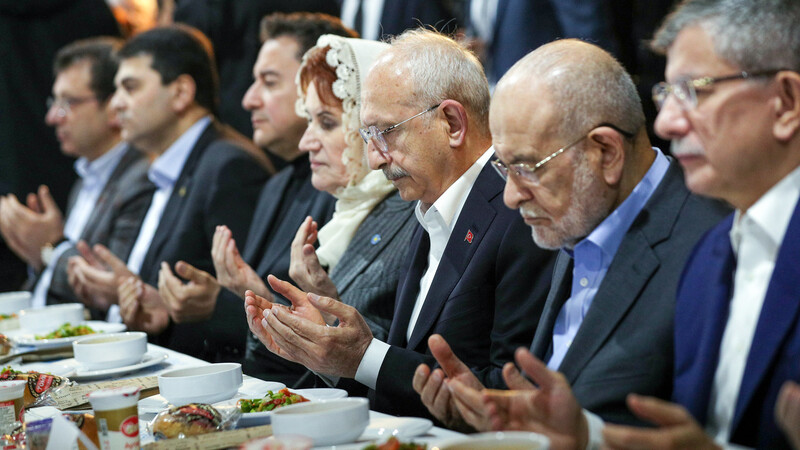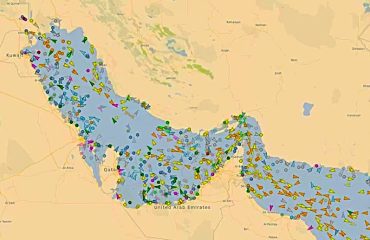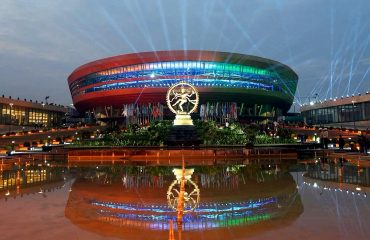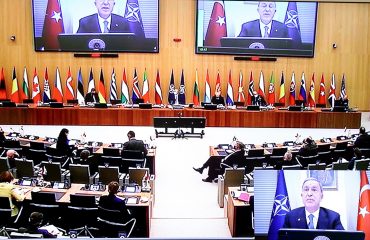

The six-party opposition coalition’s “Millet Alliance” leaders pray before a fast-breaking dinner in Malatya on March 24. CHP leader Kılıçdaroğlu has been pushing to form a broad front that goes beyond the six-party alliance in the belief that he can defeat Erdoğan in the elections by focusing on politics rather than ideology. (Photo: CHP)
The title of this article could have been “What else should Kılıçdaroğlu do?”. But with the ideological and political answers to this question, the article could have stretched in two different directions, which would have been insufficient to explain the front-politics that brought Kemal Kılıçdaroğlu, the leader of the CHP and the presidential candidate of the National Alliance, into a fierce power struggle with the President and AKP leader Tayyip Erdoğan. That is why the title of this article is “Kılıçdaroğlu’s broad-front policy; ideology and politics”.
For example, those who look at the May 14 election from an ideological perspective, which even President Erdoğan now defines as the fatal crossroad for Türkiye (and naturally for his own political power), will and do say why Kılıçdaroğlu should not cooperate with the HDP, which does not recognise the PKK as a terrorist organisation; why, as the leader of the party founded by Atatürk, he should not form an alliance with the Felicity Party, which supports the abolition of the Istanbul Convention against violence against women; or why he should not call the son of nationalist leader Muhsin Yazıcıoğlu and the wife of murdered nationalist Sinan Ateş his “companion”.
Ideology and politics
These criticisms that put ideology before politics have a grain of truth for the CHP electorate as well as for the leftist electorate in general. On the other hand, there is also some truth in the fact that it is this perspective that has prevented the CHP, to put it bluntly, since Bülent Ecevit’s leadership in the early 1970s, from both connecting with the masses and coming closer to having the government seats.
Politics cannot be done without ideology, without a set of principles and goals, or, in other words, without a programme. Can politics be done with ideology alone? It can be, but it cannot succeed in pluralist democracies. Of course, mass parties also have ideology, but they also have the political goal of winning elections, so they have to expand their sphere of influence and coverage.
The AKP is a mass party.
The CHP is a mass party; however, even though it has a strong ideology, it is not a party of ideology.
It seems that Kılıçdaroğlu has realized that carrying the CHP as a party of ideology is confining it to a threshold that cannot exceed 30 percent in Türkiye. He has decided to change this, and he sees that the path to power is not ideological, but political.
Kılıçdaroğlu and the Justice March
It was not possible to say that Kılıçdaroğlu fully dominated the party in the 2011 CHP congress when he was elected as the CHP leader after Deniz Baykal’s resignation in 2010. Baykal had still been influential, including in the preparation of candidate lists up until 2015.
Baykal started to lose his influence over the main opposition party after the June 7, 2015, general elections, when he made a deal with President Erdoğan in an attempt to regain control of the CHP. Meanwhile, the mistake he made in the 2014 presidential election by nominating Ekmeleddin İhsanoğlu, instead of the “broad front” candidate like Hikmet Çetin who could get votes from both Kurdish voters and the MHP, resulted in Erdoğan’s election as president. In fact, the 2014 election was also a search for an alliance, but without the interdependence that every alliance should have.
In the chaos after the July 15, 2016, coup attempt, the CHP made another mistake when it sided with the AKP and MHP against the HDP on the lifting of parliamentary immunity. One of the first victims was CHP deputy and fellow journalist Enis Berberoğlu.
Kılıçdaroğlu’s June 2017 Ankara-Istanbul Justice March in protest against Berberoğlu’s arrest sowed the seeds of his current frontal politics: if you were going to march, you would not march alone.
Alliance with Akşener
Meral Akşener’s starting point in the process of breaking away from the MHP and establishing the IYI Party was actually not very different. Akşener wanted to make a shift from an ideology-oriented organisation to a policy-oriented, power-oriented organisation. The 2018 elections were around the corner, but the IYI Party had legal shortcomings that prevented it from entering the elections.
It was undoubtedly difficult for Akşener to ask Kılıçdaroğlu for parliamentary support, as well as for Kılıçdaroğlu, who responded positively to the request and asked 15 deputies to temporarily join the IYI Party. Moreover, the IYI Party would not have entered the elections without the CHP’s support, but it was thanks to the Nation Alliance they formed with the CHP (against the People’s Alliance of the AKP and the MHP) that her newly formed party was able to enter the parliament.
The 2018 elections showed Kılıçdaroğlu that the 2019 local elections would also be between fronts, not parties. As a matter of fact, Akşener would later say that they were wrong not to form an alliance in the 2018 presidential elections.
With Akşener’s support, Kılıçdaroğlu was able to implement his broad front policy in the 2019 local elections, and in the end, Erdoğan had the first defeat of his rule.
Table of Six, HDP, and the broad-front
The Table of Six is a good example of how opposition parties can work together to get power, not because they share the same ideology but because they want to win.
Could anyone other than Kılıçdaroğlu have shaken hands with Islamist Felicity Party leader Temel Karamollaoğlu and made him sit at the table? Could anyone other than Karamollaoğlu shake hands with Kılıçdaroğlu and sit at the table with him? If Kılıçdaroğlu had focused on ideology, could he have met with Ahmet Davutoğlu, who had just broken with Erdoğan and whom the public holds responsible for his Syria policy, and Ali Babacan, who has served in AKP governments and has not yet started to be self-critical about his responsibility for AKP’s economic policies? Don’t look at the miniscule votes the Democrat Party received; like Saadet, the DP showed that the CHP could set aside its ideological rigidities for the sake of its political goals.
Could Kılıçdaroğlu have otherwise displayed the confidence and courage to establish contact with the HDP despite the objections of his senior partner Akşener? Obtaining the indirect support of the HDP, which is facing a closure lawsuit in the constitutional court, was indeed the work of subtle calculations. On the one hand, contacting socialist parties such as the TİP and the Left Party, and on the other, going to visit Hırka-i Şerif with Ekrem İmamoğlu on the occasion of Ramadan, should not be explained by opportunism, but rather by a focus on a political goal. Because the goal, discourse and action are in harmony, that goal is to defeat Erdoğan in the May 14 elections by forming the widest possible front.
That is why I think the title of the article could have been “What else should Kılıçdaroğlu do?”.


